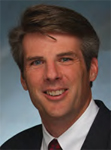A Master's Plan For Water Industry Success
By Kevin Westerling,
@KevinOnWater

The top concerns, trends, and opportunities in water are revealed by a leading voice in the industry — AWWA's CEO, David LaFrance.
Water professionals are a rare breed. We obsess over something that most people don’t consider at all, something so taken for granted as to not require thought. But water and wastewater professionals are special precisely because we know better.
Perhaps no one thinks about water more, or knows it better, than the CEO of the American Water Works Association (AWWA), David LaFrance. Obsession is part of his job, since he and AWWA are looked upon to set the agenda, and find solutions, for today’s most important water issues. That authority is what drives thousands of water professionals to AWWA’s Annual Conference and Exposition (ACE) each year, and what drove me to seek LaFrance’s input on the current challenges and opportunities facing the industry — for those of us who think about water every day.
 "As water-quality requirements become more stringent, we-re going to need more technical solutions that are innovative on how we meet those requirements."
"As water-quality requirements become more stringent, we-re going to need more technical solutions that are innovative on how we meet those requirements."
David LaFrance,
CEO,
American Water Works Association (AWWA)
“Big Three” Issues
One of the foundational tools for creating the ACE program each year is the annual State of The Water Industry survey that AWWA conducts with its members. The latest survey revealed that the three biggest concerns for the group are the following: water availability, financing, and infrastructure.
LaFrance indicated that water availability garnered additional attention for ACE15 because the host city (Anaheim) is in California, home of severe, prolonged drought. In fact, it’s one of the few places in America where the citizens actually think about water — because they’re running out of it. In California and many other water-scarce regions, utilities and industry are turning to conservation, desalination, and water reuse technologies out of necessity.
The remaining issues of the big three, financing and infrastructure, aren’t exactly new, but a new(er) strategy for dealing with them is revolutionizing utility operations. “Asset management” has grown from industry buzzword to the recognized best practice for infrastructure oversight, upkeep, and budget planning. Municipalities, private companies, consulting engineers, and AWWA/ACE have all responded by developing programs that help utilities understand and enact formalized asset management principles.
Trend-Setting
AWWA’s core focus has always been potable water quality and availability, but it recently announced a more inclusive emphasis on total water solutions — “where drinking water, wastewater, recycled water, and stormwater intersect,” LaFrance described. The new campaign is inspired by the need for, and trend toward, water reuse. LaFrance doesn’t want us to mix the message, however. “Total” is not the same as “one.” “AWWA doesn’t feel that there is ‘one water,’” he noted. “There are many waters, and the modern day water professional needs to understand the nuances of each of these different waters, because each has different characteristics.”
State Of The Industry
Despite the industry’s “big three” issues, many smaller ones, and a general lack of public awareness and support, LaFrance shared a bright outlook for the future. “I think it’s probably one of the most exciting times in history to be a water professional,” he said. “The challenges we’re facing require solutions that are attractive not only to operators and engineers, but to people from a variety of educational disciplines — communications specialists, finance specialists, conservation specialists.”
He spoke of regulations and engineering opportunity, predicting, “As water-quality requirements become more stringent, we’re going to need more technical solutions that are innovative on how we meet those requirements.” In summation, said LaFrance, “If you want to help your community, if you want to shape the economy and protect the environment, water’s the place to be.”
A great place to be, actually. Part of a rare, special breed.
